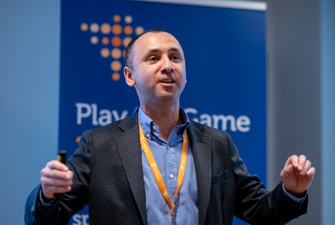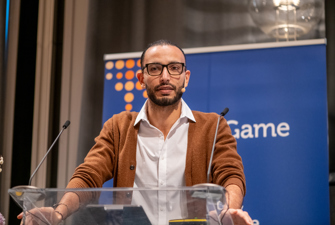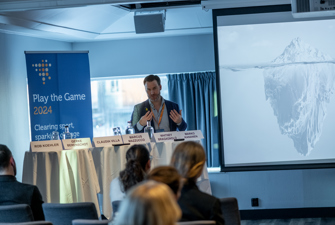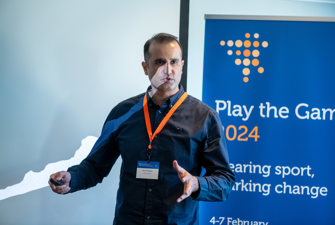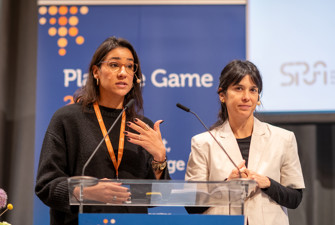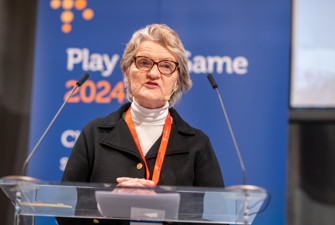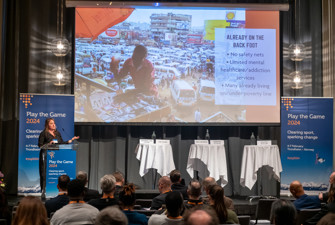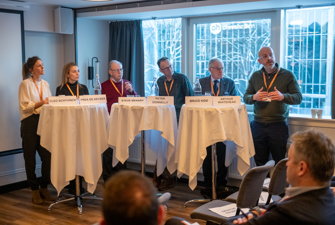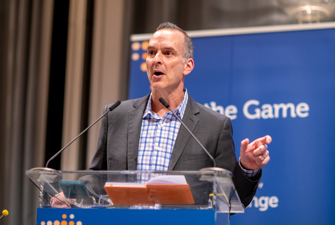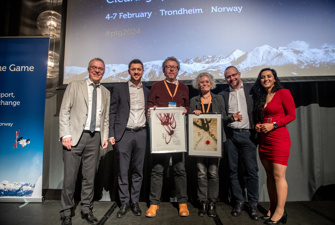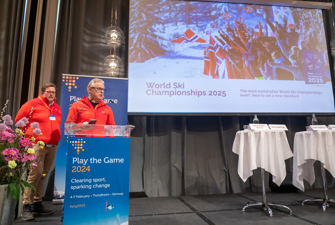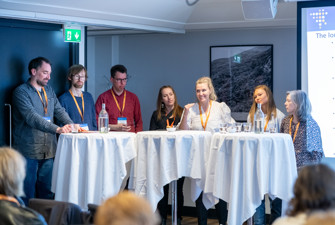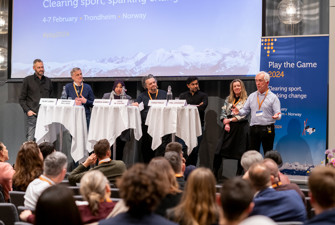A kiss to mark the end of an era
SPEECH: In his opening speech at Play the Game 2024 in Trondheim, Norway, Play the Game’s international director Jens Sejer Andersen lamented the signs of early erosion of the relatively new governance standards sports organisations committed to after public pressure.
State secretary, deputy minister, mayor, colleagues, friends, ladies and gentlemen,
No matter how often we have imagined the opening of this conference, and no matter how many times we have experienced it in the past, it is always an overwhelming moment to enter the podium, watch so many new and well-known faces gathered under one roof, and picture how much human engagement that has been built up inside you and is ready to burst over the next three and a half days.
Is there any better way to start celebrating this get-together of people that share a passion for sports integrity than with a welcome kiss?
Photo: Noemi Llamas / Eurasia Sport Images / Getty Images
Don’t worry, we won’t expose you to any unsolicited physical contact. The kiss that opens this Play the Game conference shows how even expressions that we usually cherish as representing love, togetherness and trust, can be loaded with conflicts and power games if we don’t practice them in full respect of the personal integrity of one another.
The kiss that the Spanish football president planted on the mouth of the football player and world champion Jenni Hermoso was perhaps not conceived from the outset as a conscious expression of male dominance in a feminine sport, but it rapidly turned out to mirror exactly that. The way that the Spanish football president and the whole federation soon tried to denigrate and undermine the credibility of the player that was on the receiving end of the kiss, showed that this kiss had nothing to do with love and trust, but everything to do with power.
This time, the male supremacy in sports politics did not go uncontested.
Photo: David Ramos / Getty Images
#Seacabó – it is over – became the hashtag that united not only female football players, not only Spanish women, and not only a broad majority of Spanish society, but hundreds of thousands of women and men over the world who wish to see a fundamental change in the way sport is run.
Let us hope this kiss will mark the end of one era and the opening of a new. It is highly needed. Abuse comes in many shapes and forms, as you will hear over the coming days.
Photo: Mario Hommes / DeFodi Images / Getty Images
It may not be easy to be a woman in elite sport, but it can be worse to be a child.
A few days ago, a 17-year-old girl in Russia received a four-year ban for a first-time doping offence she committed in late December 2021. The President of the World Anti-Doping Agency, Witold Banka, declared it – quote - “a win for WADA, for clean sport, and for athletes everywhere. Anyone who dopes children should be in prison.” Unquote
It sounded almost as if someone had already been jailed. Unfortunately not.
You may understand that WADA and the global anti-doping community felt relief over finally beating the Russian doping system in sport’s highest court, but this was definitely not a moment to celebrate.
Kamila Valieva was a child of 15 years when the Winter Olympics took place in Beiing in 2022 – not even old enough to take part in the Youth Olympics.
She was under a training regime with extreme physiological and psychological pressure, with dietary and medical requirements that no child deserves. When the drugs she was told to take led to a positive doping test, legal and political pressure of from all sides were added to an already unbearable situation.
With the world’s eyes upon her, international sports and anti-doping institutions started playing Kamila Valieva as a ball in a pinball machine, with an array of institutions blaming each other, unable and unwilling to make decisions that could ease the pressure put on a child.
Meanwhile, Russian sporting and political authorities used the drama in the nationalistic and militaristic propaganda a few days before Russia’s invasion in Ukraine in 2022 – the consequences of which we will hear about later, thanks to the Ukranian deputy minister of sport, Andryi Chesnokov.
No, neither WADA nor anyone else is a winner in Kamila Valieva’s case. We are all on the losing side, when after 25 years of international anti-doping efforts, sport and governments still have great difficulties holding the decision-makers, the politicians, the sports officials, the whole entourage to account.
But as in an ancient Greek tragedy, a child can be sacrificed.
Photo: DeAgostini / Getty Images
Talking about ancient times, I think most of you have heard about Sisyphus who was sentenced by the Greek gods to roll a boulder to the top of a steep hill only to watch it roll down again and start over in all eternity.
It is hard not to think about Sisyphus these days as we watch how the most powerful sports leaders deny the spirit of the governance reforms that brought themselves to power. These reforms were introduced some ten years ago, when international sport came under huge pressure from the media, the fans and politicians in the wake of the FIFA scandals, among others.
As we speak, three presidents of the world's most powerful sports federations – UEFA, FIFA, and the International Olympic Committee – are all ready to bend, or do not rule out bending, the limits of their terms as president.
Photo: IOC Media
While the presidents of UEFA and FIFA, Alexander Cefrin and Gianni Infantino, may point to some thin technical justifications for disregarding their first, irregular terms are disregarded, the IOC President Thomas Bach has no excuse for considering an extension of his mandate.
The IOC governance reforms were adopted 25 years ago and saved the organisation from a financial breakdown following a corruption scandal. Thomas Bach could ascend to power because his predecessor, Jacques Rogge, abided by the 12 year term limit – which has come to set a standard for many other international federations.
Bear in mind, that the term limit for presidents is one of the most important measures of good governance, because it reduces the risk of concentration of power. When persons from the lower hierarchy of IOC members recently were inspired to call for an extension of Bach’s mandate, he could immediately have rejected the perspective, but he did not.
It is deeply worrying that the president of an organisation that claims to be the guardian of the Olympic values, that preaches respect of rules on an off the field, and that hails principles of good governance, now considers doing the contrary. Many other sports presidents with a desire to stay indefinitely like their predecessors did, are now looking with great expectation to the Olympic headquarters in Lausanne.
However, the early erosion of relatively new governance standards is not an Olympic privilege.
Photo: Bandar Algaloud Saudi Kingdom Council Handout - Anadolu Agency via Getty Images
From the house of FIFA, promises were made a decade ago that the selection of World Cup host countries should no longer be made in a closed circle of an Executive Committee, but in an open and transparent process involving the congress.
These promises seem long forgotten. When FIFA in one move appointed the hosts of the men’s world cup for 2030 and de facto secured Saudi Arabia the right to host the World Cup 2034, the process laughed in the face of all the promises made to football fans, players, sponsors, journalists, and governments in the past decade.
Photo: Joe Skipper / Getty Images
To add insult to injury, it seems that a high court decision in the US will reverse the hope that came after corrupt football leaders were convicted following FBI’s crackdown on FIFA’s congress in 2015. The high court decision opens up for the sports leaders to have their convictions declared null and void and be able to claim back the bribes they had to return to FIFA.
Will the boulder really roll down the hill again?
Photo: Ni Minzhe / CHINASPORTS/VCG / Getty Images
You may ask how sports organisations can continue getting away with ignoring their own rules and their very public promises. The answer can be boiled down to two words: Autonomy and monopoly.
International sports organisations enjoy a de facto global monopoly over very attractive products, and each of the organisations functions like a one-party state where the top leadership can favour its supporters and crack down on opponents.
Moreover, the sports organisations are probably the only global billion-dollar industries that is by and large regulated according to the principle of association freedom – which means: very little control.
Although sport is heavily subsidised by public money, it claims to be a self-sustaining eco-system where the riches of the elite keep the grassroots alive. And when elected politicians now and then dare to ask what becomes of the taxpayers’ money and why top sport is so vulnerable to corruption and crime, a curse is thrown at them:
Don’t mess with the autonomy of sport.
So where do we find the strength to roll up the boulder and find hope that it will not just roll down again?
Photo: Thomas Søndergaard / Play the Game
At Play the Game, our hope is you. We can all draw collective strength from the fact that – among many other things – more than 400 professionals and activists committed to a more democratic and transparent sports world, have travelled this far to share knowledge and experience.
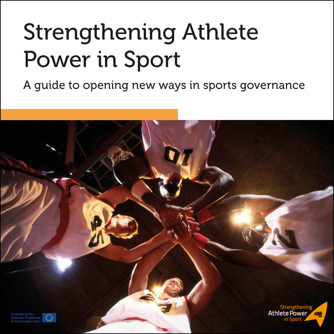
We build our hope on the fact that a new generation of athletes is increasingly asking to have a say about how their sporting life is organised. In the project Strengthening Athlete Power in Sport – which you will hear about Tuesday evening – we gathered best practices and made recommendations based on a simple premise: Athletes are not always right, but athletes always have rights. Human rights are athletes’ rights.
Photo: Thomas Søndergaard / Play the Game
We also found motivation when our latest conference in 2022 sent a clear message to Play the Game to start reviving the old idea of an international, all-encompassing agency to combat sports crime, corruption and abuse. This inspired us to ask some 250 experts and stakeholders about how such an agency could work. No less than 80% chose to respond, feeding us more than 800 insightful comments, a very convincing signal that people with insight in sports corruption and crime are impatient to see progress in their field.
Photo: Play the Game
While democratic governments at the highest political level are still tiptoeing when confronting international sports organisations, their judicial authorities have – literally speaking - put their boots on their ground. Even if the FIFA processes should suffer a setback, the criminal prosecutors have done more than any other group in the past ten years to bring powerful sports leaders to justice.
So here is another encouragement: Public prosecutors are now establishing an international group of their own – the so-called MARS network - with the support of the Council of Europe. Today and later you will meet the chair and the vice-chair of the MARS network, Jean-Yves Lourgoullioux from France and Ann Lukowiak from Belgium – accompanied by the newly appointed general prosecutor of Belgium, Frédéric van Leeuw. Knowing the scope of challenges the three of you face on a daily basis, we are beyond grateful you have taken time to join us here in Trondheim.
Photo: Play the Game
This evening we welcome you all to come to a book launch and get a free copy of this book about sports politics in the times of Play the Game. We gave it the title “When the silence of sport was broken” – because if anything has characterised sport since the turn of the century, it is that taboos have been broken, and Play the Game has contributed somewhat to that development.
The book documents what hard-working investigative journalists, courageous whistleblowers, sharp academic analysts, athletes, survivors, antidoping officials, NGOs, and many other stakeholders – even a few sports leaders – have set in motion over a quarter of a century and that we will continue to move over the next few days.
Together we will embark on an array of extremely sensitive issues. Issues of war and peace, democracy and autocracy, corruption and crime, abuse in many shapes and forms, climate threats… issues that can seriously affect our individual and collective lives.
Ladies and gentlemen, you have come here because you have a passion for one or more of these themes. It is my hope that to that passion, you will add compassion.
Play the Game is established to strengthen democracy through dialogue: We believe that a free and fact-based exchange of knowledge, experiences and opinions will make us all a bit wiser and more capable of tackling the challenges in the turbulent world around us.
